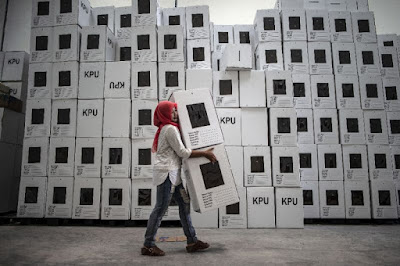Yahoo – AFP,
Harry PEARL, April 15, 2019
 |
It is Indonesia's biggest polls, with 190 million voters and 245,000 candidates
standing for the presidency, parliament and local positions (AFP Photo/Juni Kriswanto) |
Dipping
their fingers in halal ink to prevent double voting, Indonesians cast their
ballots Wednesday in a bitterly contested presidential election, with the main
rival to incumbent Joko Widodo already threatening to challenge the result over
voter-fraud claims.
The
Muslim-majority nation's biggest-ever polls -- with more than 190 million
voters and 245,000 candidates vying for the presidency, parliament and local
positions -- is largely a referendum on Widodo's infrastructure-driven bid to
rev up Southeast Asia's largest economy.
But,
looming in the background, two decades of democratic gains are at risk of being
eroded, analysts said, as the military creeps back into civilian life under
Widodo, and his trailing rival Prabowo Subianto, a former general, eyes reforms
that harken back to the Suharto dictatorship.
If he
loses, Subianto's camp has already warned it will challenge the results over
voter-list irregularities.
"It's
high stakes in this election," said Evan Laksmana, a senior researcher at
the Jakarta-based Centre for Strategic and International Studies.
 |
The
election is largely a referendum on President Joko Widodo's
infrastructure-
driven bid to rev up Southeast Asia's largest economy (AFP
Photo/BAY ISMOYO)
|
"We
simply don't know what (Subianto) would do if he won and we don't know if the
institutional constraints in place would contain him."
Halal ink
Voting
starts at 7:00 am local time Wednesday (2200 GMT Tuesday) in easternmost Papua
and ends at 1:00 pm at the other end of the country in Sumatra.
Ballots
will be cast at more than 800,000 polling booths across the volcano-dotted
country, from the tip of jungle-clad Sumatra and heavily populated Java island
to beach paradise Bali and far-flung Sumbawa.
Voters will
punch holes in ballots -- to make clear their candidate choice -- and then dip
a finger in Muslim-approved halal ink, a measure to prevent double-voting in a
graft-riddled country where ballot buying is rife.
A series of
so-called "quick counts" are expected to give a reliable indication
of the presidential winner later Wednesday. Official results are not expected
until May.
Most polls
show the 57-year-old Widodo holding a double-digit lead over Subianto, 67,
setting up a repeat of their 2014 contest, which Widodo won despite an
unsuccessful court challenge over his narrow victory.
 |
Voters dip
their finger in halal ink after casting their ballot, like this Indonesian
woman shown after advance overseas voting in Malaysia (AFP Photo/Mohd RASFAN)
|
The race
has been punctuated by bitter mudslinging between the two camps,
religion-driven identity politics and a slew of fake news online that threatens
to sway millions of undecided voters.
'Pragmatism over principle'
Widodo
campaigned on his ambitious drive to build roads, airports and other
infrastructure, including Jakarta's first mass-rapid-transit system.
But his
rights record has been criticised owing to an uptick in discriminatory attacks
on religious and other minorities, including a small LGBT community, as Islamic
hardliners become more vocal in public life.
"(Widodo)
has chosen pragmatism over principle on issues of Islamism and pluralism,"
said Dave McRae, a senior lecturer at the University of Melbourne's Asia
Institute.
Widodo, a
practising Muslim, blunted criticism that he was anti-Islam by appointing
influential cleric Ma'ruf Amin as his running mate.
But victory
for Widodo and Amin -- known for his disparaging views towards minorities --
could be the latest knock to Indonesia's reputation for moderate Islam.
 |
Former
general Prabowo Subianto has run on a fiery nationalist ticket, courting
Islamic hardliners and promising to boost military spending (AFP Photo/Juni
Kriswanto)
|
"There
is a longstanding track record of very conservative views," Kevin
O'Rourke, an Indonesia-based political risk analyst, said of Amin.
"It's
inevitable that will affect policy making."
Subianto --
joined by running mate Sandiaga Uno, a 49-year-old wealthy financier -- has run
on a fiery nationalist ticket.
He courted
Islamic hardliners, promised a boost to military and defence spending and,
taking a page from US President Donald Trump, vowed to put "Indonesia
first" as he pledged to review billions of dollars in Chinese investment.
Subianto's
presidential ambitions have long been dogged by strong ties to the Suharto
family and a chequered past.
He ordered
the abduction of democracy activists as the authoritarian regime collapsed in
1998, and was accused of committing atrocities in East Timor.
 |
Ballots
will be cast at more than 800,000 polling booths across the volcano-dotted
country, including tsunami-ravaged Palu on the island of Sulawesi (AFP
Photo/
OLAGONDRONK)
|
'Low
probability, high impact'
Widodo's
own cabinet is stuffed with Suharto-era figures, and he raised eyebrows by
agreeing to give civilian government jobs to military brass.
But
"there is no grand design for Jokowi to bring back military rule",
Laksmana said.
Subianto,
however, is a military man keen to roll back reforms that ushered in direct
presidential elections, analysts said.
That has
raised questions about what an upset victory for the retired general could mean
for a system that is supported by most Indonesians.
"Democracy
itself would be very much at stake," O'Rourke said.
"This
is a low probability scenario, but one with very high impact."
Many
Indonesians just want a peaceful power transition -- regardless of the winner.
"I
hope there's no hostility," said 53-year-old Untung Sri Rejeki.
"No
matter who becomes our next president."



















